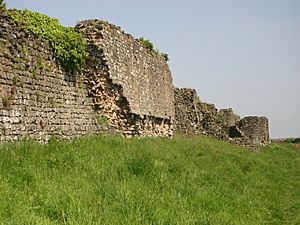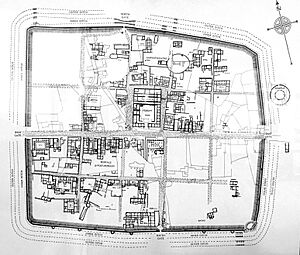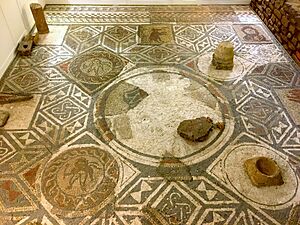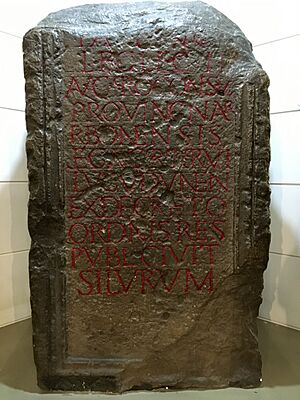Venta Silurum facts for kids
Quick facts for kids Venta Silurum |
|
|---|---|

The remains of the town wall
|
|
| Location | Monmouthshire, Wales, UK |
| OS grid reference | ST469905 |
| Lua error in Module:Location_map at line 420: attempt to index field 'wikibase' (a nil value). | |
Venta Silurum was an important town in Roman Britain. Its name means "the town of the Silures." The Silures were a powerful local tribe. Today, you can see its remains in the village of Caerwent in Monmouthshire, southeast Wales. Many parts of the town have been dug up by archaeologists. The Newport Museum displays many of the amazing things found there.
Contents
Exploring Ancient Venta Silurum
How Venta Silurum Began
The Romans built Venta Silurum around AD 75. It was a main center for the Silures tribe after they were defeated. The town's name, "Market town of the Silures," is seen on the "Civitas Silurum" stone. This stone is now in the local church.
Venta was on a main Roman road. This road connected Isca Augusta (Caerleon) and Glevum (Gloucester). It was also near the Severn Estuary. Unlike nearby Roman forts, Venta was mostly for running the government, not for soldiers.
Growing as a Roman Town
At first, Venta had a forum and a basilica. These were important public buildings. By the early 100s AD, during the time of Emperor Hadrian, the town started building a market. It also became a center for local government.
Public baths and shops were built around the same time. One shop was a blacksmith's. Archaeologists have also found remains of farms and homes. Some of these homes had courtyards.
A Roman temple was found in the town. It might have been for Mars, the Roman god of war. It may also have been for Ocelus, a Celtic god. A special bowl with a chi-rho symbol shows that early Christian worship began here. This was in the late 200s AD.
The town did not have strong defenses until the mid-300s AD. That's when stone town walls were built. A small group of soldiers might have stayed in the town then. Large parts of these defensive walls are still standing today. Some sections are up to 5 metres (16 ft) tall. Experts say these walls are "the most impressive town defense to survive from Roman Britain." They are also "one of the most perfectly preserved in Northern Europe."
What Happened After the Romans Left?
The Roman legions left Britain. But Venta Silurum stayed busy until at least the mid-400s AD. Early Christian worship continued there. The town might even have had a bishop.
Stories say that Saint Tatheus started a monastery around the 500s AD. The current church stands on part of an old Christian cemetery.
The name Venta later became the name for the Kingdom of Gwent. The town itself was called Caer-went. This means "the fort of Venta/Gwent." Legend says that Caradog Freichfras, a ruler of Gwent, moved his court. He moved it from Caerwent to Portskewett around the 500s AD.
Uncovering Venta Silurum's Secrets
In 1881, a colorful floor mosaic was found. It showed different kinds of fish. This was during digs in a cottage garden. In 1901, two more mosaic floors were found in a house. One was the Four Seasons mosaic, now in the Newport museum.
In 2008, a team from Wessex Archaeology and local volunteers dug again. They found a row of narrow shops. They also found a villa with painted walls and mosaic floors. Among the artifacts found were a bone penknife handle. It showed two gladiators fighting. They also found coins, Roman glassware, pottery, and bones. Pieces of mosaic and lead patches for water pipes were also discovered.
These exciting finds were shown on the TV show Time Team in 2009. More archaeological work in 2010 by Monmouth Archaeology also found many interesting things.
Today, modern houses cover half of the old Roman market. But you can still see the ruins of several Roman buildings. These include the foundations of a 4th-century temple. Most of the Roman houses were quite simple. Few had mosaics or hypocaust-heated floors. This shows that Venta Silurum was a large settlement, but not as grand as some other Roman-British towns.
See also
 In Spanish: Venta Silurum para niños
In Spanish: Venta Silurum para niños
 | Janet Taylor Pickett |
 | Synthia Saint James |
 | Howardena Pindell |
 | Faith Ringgold |




